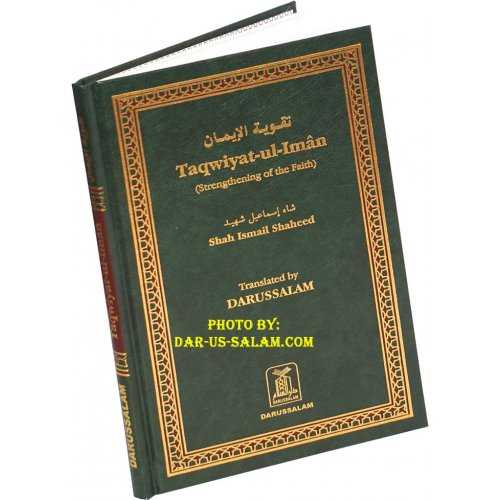Important Points About The Status Of The Sunnah In Islam
The status of the sunnah in Islam is an important topic. The book in question in this collection of notes, The Status Of The Sunnah In Islam, clarifies the position of the Sunnah in Islaam, in that it bears the same status as the Qur’aan when it comes to deriving religious rulings and laws. So one cannot possibly understand and implement the Qur’aan in the absence of the Sunnah, rather they go hand in hand. Imaam Al-Albaanee gives several examples for this.
It is obvious that after all of this we must say: Indeed, the Sunnah that bears this importance in Legislation (i.e. making Islamic laws), only refers to the Sunnah that is authentically reported on the Prophet صلى الله عليه وسلم by way of the knowledge-based paths and authentic chains of narration, which are well known to the scholars of Hadeeth and Narrators. It does not refer to that which is contained within the various books of Tafseer and Fiqh, or the books on Targheeb and Tarheeb, or those of Raqaa’iq and Mawaa’idh, for indeed many of the weak, rejected and fabricated ahaadeeth can be found in them.
Some of these ahaadeeth, Islaam is completely free from, such as the hadeeth about Harut and Marut, and the story on the satanic verses (gharaneeq). I wrote a specific treatise refuting this narration, which has been published.[2] I have referenced a score of them in my book, the collection: Silsilat-ul-Ahaadeeth ad-Da’eefah wal-Mawdoo’ah wa Atharuhaa as-Sayy fil-Ummah.” So far the number of ahaadeeth in them has reached close to four thousand.[3] And they consist of ahaadeeth that are either weak or fabricated. Only five hundred ahaadeeth from these have been published so far! So it is an obligation upon the people of knowledge, particularly those that propagate their Fiqh and verdicts to the people, to not be overconfident in using the hadeeth as proof except after becoming sure about its authenticity. This is especially since the books of Fiqh that are commonly referenced today are filled with ahaadeeth that are weak, rejected and those that have no source to them, as is well known to the scholars.
It is obligatory for one to look for the ruling in the Sunnah, even if he thinks that it exists in the Qur’aan
A Weak Hadeeth from Mu’aadh regarding Opinion, and what is Rejected from it:
Before I finish my talk, I feel that it is necessary for me to direct the attention of the brothers in attendance to a famous hadeeth, which seldom is missing from the books on the Principles of Fiqh. I will mention it because it is weak, from the perspective of its chain of narration as well as it being in contradiction with what I spoke about in this talk, which was the lack of there being any distinction between the Qur’aan and the Sunnah when it comes to deriving Laws, and the obligation of accepting these two sources together.
Indeed it is the hadeeth of Mu’aadh bin Jabal radhi Allaahu anhu who reported that the Prophet صلى الله عليه وسلم said to him when he sent him to Yemen:
“With what will you judge by?”
He said: “By the Book of Allaah.”
He صلى الله عليه وسلم said: “And if you don’t find (the answer in) it?”
He said: “Then by the Sunnah of Allaah’s Messenger.”
He replied: “And if you don’t find (the answer in) it?”
He said: “I will strive to form my own opinion.”
So he صلى الله عليه وسلم said: “All praise be to Allaah who guided the messenger of Allaah’s Messenger to that which Allaah’s Messenger loves.”
As for the weakness of its chain, then this is not the place to discuss it now. But I clarified this exhaustively, perhaps the likes of which was not undertaken in the past, in (my book) the “Silsilah” (of weak hadeeth) I mentioned previously. [4] But suffice it to say now that the Ameer-ul-Mu’mineen in Hadeeth, Imaam Al-Bukhaaree, said about this hadeeth that it was “rejected.”
So having said this, it is now possible for me to begin explaining the contradiction it poses, which I stated earlier. So I say:
This hadeeth establishes a methodology of ruling for the judge, based on three stages. He is not permitted to seek a ruling from his opinion unless after he acknowledges he can’t find it in the Sunnah. Nor is he allowed to derive a ruling from the Sunnah until after he establishes he can’t find it in the Qur’aan. With respect to the opinion, this method (of deriving a ruling) is valid and correct according to all of the scholars, which is why they would say: “When the narration is mentioned, the opinion is nullified.”
However, with respect to the Sunnah, this method is not correct, because the Sunnah determines and explains the Book of Allaah. So it is obligatory for one to look for the ruling in the Sunnah, even if he thinks that it exists in the Qur’aan, based on what we stated previously. So the Sunnah with respect to the Qur’aan is not like the opinion with respect to the Sunnah. No, definitely not. Rather we must consider the Qur’aan and the Sunnah as one source, there being no distinction between them at all. This is as has been indicated in the sayings of the Prophet صلى الله عليه وسلم: “Indeed, I was given the Qur’aan and something similar to it, along with it” – meaning the Sunnah – and “They will not be separated from one another until they return to the Fountain.”
So this dividing them into categories, mentioned in the hadeeth, is not correct, because it necessitates that they are separate from one another. And this is false, as I have explained previously.
The Misguidance of those who are satisfied with the Qur’aan over the Sunnah
It is unfortunate that there can be found some contemporary tafseer writers and authors that have taken the view of making permissible what has been mentioned in the last two examples [1] , such as the permissibility of eating predatory animals and wearing gold and silk, relying upon the Qur’aan (as proof) only! In fact, there can be found in this present time a group that call themselves the Qur’aaniyoon, who interpret the Qur’aan according to their desires and intellects, without seeking assistance for that in the authentic Sunnah. Rather, the Sunnah, according to them, is subordinate to their desires. So whatever part of it conforms to their desires, they affirm it, and whatever doesn’t conform to their desires, they throw behind their backs (rejecting it).
The Prophet صلى الله عليه وسلم indicated these individuals in an authentic hadeeth, when he said:
“Do not let any one of you sit reclining on his couch, then when something that I have commanded him to do comes to him, he says: ‘I don’t know! Whatever we find in the Book of Allaah, we will follow it.’”
[Reported by At-Tirmidhee]
And in another narration, he صلى الله عليه وسلم said:
“…’whatever we find in it that’s unlawful, we will declare unlawful.’ Indeed, I was sent with the Qur’aan and something equal to it along with it.”
In another report, he صلى الله عليه وسلم said:
“Indeed, whatever the Messenger of Allaah صلى الله عليه وسلم forbade is the same as what Allaah forbade.”
Rather, what is unfortunate is that one dignified author wrote a book on the Legislation and Creed of Islaam. He stated in his introduction that he wrote the book but he had no references in it except for the Qur’aan! So this authentic hadeeth provides clear proof that the Islamic Legislation is not based on the Qur’aan only, but rather it is based on the Qur’aan and Sunnah. So whoever takes hold of one in the absence of the other, doesn’t actually take hold of any of them. This is because each one of them commands that the other one be adhered to. This is as Allaah says:
“Whoever obeys the Messenger, has indeed obeyed Allaah.”
[Surah An-Nisaa: 80]
And He says:
“But no, by your Lord, they can have no Faith, until they make you (O Muhammad) judge in all disputes between them, and find in themselves no resistance against your decisions, and accept (them) with full submission.”
[Surah An-Nisaa: 65]
And He says:
“It is not for a believer, man or woman, when Allaah and His Messenger have decreed a matter that they should have any choice in their decision. And whoever disobeys Allaah and His Messenger, has indeed strayed in a plain error.”
[Surah Al-Ahzaab: 36]
And He says:
“And whatever the Messenger gives you then do it, and whatever he forbids you from, then abstain from it.” [Surah Al-Hashr: 7]
In connection with this ayah, I am amazed at what has been authentically reported from Ibn Mas’ood radhi Allaahu anhu, which is that a woman once came to him and said: “Are you the one who said: ‘May Allaah’s curse be on the woman that puck eyebrows and those who ask for their eyebrows to be plucked and those who tattoo…’ He said: ‘Yes.’ She said: ‘I read the Qur’aan from its front to its back and I did not find in it that which you say!’ He responded: ‘If you had (truly) read it, you would have found it. Did you not read: ‘And whatever the Messenger gives you then take it (i.e. do it), and whatever he forbids you from, then stay away from?’ She said: ‘Of course!’ He صلى الله عليه وسلم said: ‘Then I indeed heard The Messenger of Allaah صلى الله عليه وسلم say: ‘May Allaah’s curse be on the woman that pluck eyebrows and those who ask for their eyebrows to be plucked…’” [Reported by Al-Bukhaaree and Muslim]
The Need for the Sunnah in order to Understand the Qur’aan
The Need for the Sunnah in order to Understand the Qur’aan, and Examples for that:
Allaah’s statement:
“The male and the female thief – cut off their hands” [Surah Al-Maa’idah: 38] is a good example of this, for the word “thief” mentioned in it, is absolute, as is the case with the word “hand.”
The verbal Sunnah explains the first of these two (words) and restricts it to mean just the thief that steals a quarter of a dinaar. The Prophet صلى الله عليه وسلم: “There is no cutting off of the hand except in (cases where one steals) a quarter of a dinaar and more.”
[Reported by Al-Bukhaaree and Muslim]
Likewise, the Prophet صلى الله عليه وسلم explained the second (word) with his action or with the action of his Companions and his approving of that. This is since they would cut the hand of the thief off from the wrist, as is well known from the books of Hadeeth.
The verbal Sunnah also explains the “hand” that is mentioned in the verse concerning Tayammum:
“Then wipe your faces and hands” [Surah An-Nisaa: 43, Surah Al-Maa’idah: 6] in that it can also refer to the palm.This is based on the Prophet’s saying: “Tayammum is a tap (i.e. wipe) of the face and hands.”
[Reported by Ahmad, Al-Bukhaaree, Muslim and others from the narration of ‘Ammaar bin Yaasir radhi Allaahu anhu]
Below are some other verses from the Qur’aan that cannot be understood correctly, according to what Allaah intended, unless by way of the Sunnah.
1. Allaah says:
“It is those who believe and mix not their Faith with dhulm (wrong) – for them (only) there is security and they are the guided ones.” [Surah Al-An’aam: 82]
The Companions of Allaah’s Messenger صلى الله عليه وسلم understood the phrase “with dhulm (wrong)” according to its general sense, which includes every wrong, even if it be small. This is why they had difficulty understanding the verse and so they said: “O Messenger of Allaah! Which one of us doesn’t mix their Faith with wrong?” So the Prophet صلى الله عليه وسلم said: “It doesn’t mean that. It only means Shirk (here). Didn’t you hear Luqmaan say:
‘Verily Shirk is a great wrong?’ [Surah Luqmaan: 13]”
[Reported by Al-Bukhaaree, Muslim and others]
2. Allaah’s says:
“And when you travel in the land, there is no sin on you if you shorten your prayer, if you fear that the disbelievers may attack you.” [Surah An-Nisaa: 101]
The literal wording of this verse necessitates that shortening the prayer while on a journey can only be done on the condition when one is in the state of fear. This is why some of the Companions asked Allaah’s Messenger: “So then why do we shorten the prayer when we are in a state of security?” He صلى الله عليه وسلم replied: “This is a charity that Allaah has expended to you, so take His charity.” [Reported by Muslim]
3. Allaah says:
“Forbidden to you (for food) are: al-maytatah (dead animals), blood, the flesh of swine…” [Surah Al-Maa’idah: 3]
But the verbal Sunnah explains that deceased locusts and fish, as well as liver and spleen (types) of blood are lawful. The Prophet صلى الله عليه وسلم said: “Two types of deceased animals and two types of blood have been made lawful for us: locusts and sea fish [meaning all types of fish], and the liver and the spleen.”
[Reported by Al- Bayhaqee and others in marfoo’ and mawqoof form. The chain of the mawqoof narration is authentic and it takes on the ruling of being marfoo’ since it cannot be stated based on one’s mere opinion.]
4. Allaah says:
“Say (O Muhammad): ‘I find not in that which has been inspired to me anything forbidden to be eaten by one who wishes to eat it, unless it be maytah (a dead animal) or blood poured forth (by slaughtering), or the flesh of swine (pork), for that surely is impure, or impious (unlawful) meat (of an animal) which is slaughtered as a sacrifice for other than Allaah…’” [Surah Al-An’aam: 145]
Then the Sunnah came and forbade other things that haven’t been mentioned in this ayah, such as the Prophet’s صلى الله عليه وسلم saying: “Every predatory animal that has fangs and every bird that has claws is unlawful (for eating).” There are also other ahaadeeth on this subject that forbid other animals, such as what the Prophet صلى الله عليه وسلم said on the Day of Khaybar: “Verily Allaah and His Messenger forbid you from (eating) domesticated donkeys, for they are impure.” [Reported by Al-Bukhaaree and Muslim]
5. Allaah says:
“Say (O Muhammad): ‘Who has forbidden the adornment with clothes given by Allaah, which He has produced for his slaves, and the good (lawful) things from provision?’” [Surah Al-A’raaf: 32]
But the Sunnah explains that there are certain types of adornments that are forbidden. It is authentically reported that the Prophet صلى الله عليه وسلم went out one day to meet his Companions holding silk in one hand and gold in the other, and said: “These two things are unlawful for the males of my ummah, (but) lawful for the females.” [Reported by Al-Haakim who authenticated it] The ahaadeeth bearing this same understanding are many, well known and can be found in the two Saheeh collections as well as other collections.
There are many more examples like these (above) that are known to the people who have knowledge of Hadeeth and Fiqh. So from what has been stated previously, it should become clear to us, O brothers, the importance of the Sunnah in deriving Islamic laws. For indeed if we look back again at the examples I mentioned before, not to mention those that I didn’t mention, we will have certainty that there is no way to understand the noble Qur’aan, unless we understand it along with the Sunnah.
In the first example, the Companions understood the word “dhulm” mentioned in the ayah according to its literal meaning. This was even though they, may Allaah be pleased with them, were as Ibn Mas’ood said: “The best of this ummah, possessing the most pious of hearts, profound in learning and the least of constraints.” But in spite of this, they erred with regard to understanding that. So if it were not for the Prophet refuting their error and guiding them to what was correct with regard to the meaning of “dhulm” – that it in fact meant Shirk here – we would have followed them upon their error. However, Allaah, Mighty and Majestic, saved us from that due to the grace of the Prophet’s guidance and Sunnah.
And in the second example: if it weren’t for the aforementioned hadeeth, we would have remained in doubt, to say the least, regarding shortening the prayer while on a journey in the state of security. That is to say if we wouldn’t have already taken the view of making being in the state of fear a condition, as is literally stated in the ayah. This is also just what the Companions themselves understood (about the ayah) until they saw the Prophet صلى الله عليه وسلم shorten his prayer, and they shortened their prayer along with him, while they were in a state of security.
In the third example: If it weren’t for the hadeeth, we would have been forbidden from foods that were made lawful for us, such as (dead) locusts and fish, and liver and spleen.
In the fourth example, if it weren’t for the hadeeth, which mentions some things (not mentioned in the ayah), we would have made lawful what Allaah had made forbidden through the tongue of the Prophet صلى الله عليه وسلم, such as predatory (fanged) animals and birds with claws.
The same goes for the fifth example, if it weren’t for the ahaadeeth reported in that regard, we would have made lawful that which Allaah made unlawful upon the tongue of the Prophet, such as silk and gold. This is why some of the Salaf used to say: “The Sunnah judges upon the Book (i.e. Qur’aan).”
Knowledge of Arabic is not sufficient for understanding the Qur’aan
Knowledge of Arabic is not sufficient for understanding the Qur’aan:
From what has been stated previously, it becomes clear that there is no way for anyone, even if he be a scholar of the Arabic Language and its disciplines, to understand the noble Qur’aan, without seeking assistance in that from the Prophet’s Sunnah in speech and action. This is since he will never be more knowledgeable of the language than the Companions of the Prophet, those who the Qur’aan was revealed to in their language. And (at that time) the language was not blemished with the errors of the non-Arabs and the slang of the common people, but in spite of that, they still erred in understanding these previously mentioned ayaat, when they relied on their knowledge of the language only.
So based on this, it is obvious that whenever a person is knowledgeable of the Sunnah, he will be more likely to understand the Qur’aan and extract rulings from it, than someone who is ignorant about it. So how about the one who doesn’t rely on it or reference it at all? This is why from the principles that have been agreed upon by the people of knowledge is: to interpret the Qur’aan with the Qur’aan and the Sunnah,1 and then the sayings of the Companions, etc.
From this, we become aware of the misguidance of the scholars of rhetoric, past and present, and their opposition to the Salaf, in their Creed, not to mention their rulings. And it is their remoteness from the Sunnah and their knowledge of it, and their making their intellects and desires as judges for themselves with regard to the verses concerning Allaah’s Attributes. What is better than what has been stated in Sharh Al- ‘Aqeedah At-Tahaawiyyah [of Ibn Abil-‘Izz Al-Hanafee] (pg. 212, 4th Edition):
“How can someone who didn’t learn from the Book and the Sunnah, but rather just learned it from the views of so and so, speak about the fundaments of the Religion! And if he claims that he is taking it from the Book of Allaah, then he is not taking the interpretation of the Book of Allaah from the ahaadeeth of the Messenger. He doesn’t look into it (i.e. the Sunnah), nor does he look at what the Companions or those who succeeded them in goodness said, which has been conveyed to us by way of reliable narrators chosen by the critics (i.e. hadeeth scholars). For indeed, they did not convey the arrangement of the Qur’aan only, but rather they conveyed the arrangement as well as the meanings. They would not learn the Qur’aan like the children do (today), rather they would learn it along with its meanings. And whoever does not follow their path, then he is speaking based on his opinion. And whoever speaks from his opinion, and from what he thinks Allaah’s Religion is, not getting that from the Book, he is in fact sinning (!), even if he may be correct. Whereas whoever takes from the Book and the Sunnah, he is rewarded even if he errs. However, if he is correct, his reward is multiplied.”
Then he said (pg. 217):
“So it is an obligation to completely submit to the Messenger صلى الله عليه وسلم, follow his orders, and meet his reports with acceptance and firm belief, without contradicting that by false notions that we consider “reasonable” or that constitute a misconception and doubt. Or that we put before it the views of men and the rubbish held in their minds. So we must single the Prophet صلى الله عليه وسلم out with regard to making him the judge, submitting to him, obeying him and complying with him, just as we single out the One who sent him in worship, humility, submissiveness, repentance and reliance (to Him).”
In summary: It is an obligation upon all of the Muslims to not differentiate between the Qur’aan and the Sunnah, with regard to the obligation of accepting both of them together and establishing Laws based on both of them. Indeed this is the guarantee that will prevent them from drifting to the right and the left, and from returning to deviation.
This is as the Prophet صلى الله عليه وسلم clearly stated:
“I have left two things for you, which you will never go astray so long as you adhere to them: The Book of Allaah and my Sunnah. These two will never separate from one another until they return to the Fountain.”
[Reported by Maalik and Al-Haakim with a sound chain of narration]

Don’t forget to comment & share. Also please click our ads, they pay the bills. jazakallahu khayr.


